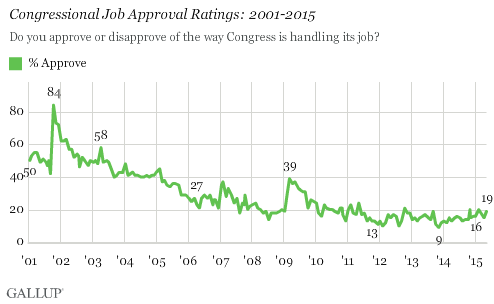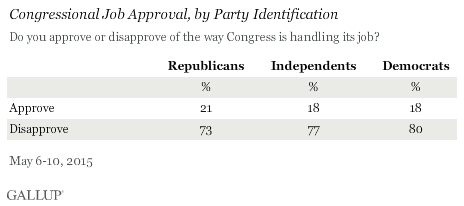Story Highlights
- Congressional job approval at 19%, essentially unchanged
- Approval of GOP Congress similar among Republicans and Democrats
WASHINGTON, D.C. -- Congressional job approval, currently at 19%, remains stuck near historical lows, despite a number of recent high-profile legislative achievements.

Over the past month, Congress has confirmed the stalled nomination of Attorney General Loretta Lynch and both chambers passed a bill that was signed into law regarding Medicare. Bills that would authorize limited congressional oversight on any international agreement with Iran and help victims of human trafficking passed the Senate with little or no opposition. The uptick in activity, though hardly historic, is notable compared with the past two Congresses. Those Congresses, marked by divided control of the two chambers, were known for their entrenched partisan gridlock and few legislative accomplishments. And Americans didn't care for their inability to agree -- they gave Congress its lowest approval ever over this time period. Gallup found in June 2013, six months into the previous Congress, that gridlock and ineffectiveness were the most frequently cited reason for Americans' disapproval of Congress.
Several months into this new Congress, the accomplishments that have been realized could give one the impression that the gridlock is softening, particularly over the past month. But these achievements have had virtually no impact on Congress's job approval compared with early April (15%).
And, of course, Congress is far from working perfectly now, even if the pace of work appears to have increased. Most dramatically, the Senate failed to overcome a Democratic filibuster Tuesday afternoon that would give the president enhanced authority in negotiating trade bills, though the May survey was conducted before this occurrence. Legislation authorizing the use of military force in Iraq and Syria to fight ISIS, proposed by the administration and which many members of Congress support, remains stalled.
GOP Congress Has Low Approval Among Republicans
A key reason the current 114th Congress appears to be having more legislative success than the two Congresses before it is that the House and Senate are now under one party's control. Unified GOP control of Capitol Hill should, at least in theory, boost Republicans' overall approval of Congress. But the expected "Republican rally" for Congress has yet to materialize -- 21% of Republicans and Republican leaners approve of Congress, not much different from the 18% of independents and of Democrats who approve. Nor is Republican support notably higher than the 15% it reached in 2014, despite the decided Republican tilt of this year's legislature.

Bottom Line
After years of dysfunction, Congress is moving forward on key pieces of legislation. No longer shackled by split control -- though still facing a president of the opposite party -- the legislative branch is suddenly finding some areas of agreement. But even if it appears that the gridlock is easing, the overwhelming majority of Americans still disapprove of Congress. If Congress continues passing bipartisan legislation, more Americans might soften their stance. Still, it may be that Americans are largely not aware of or impressed by Congress' recent legislative successes. Or it may be that the hit to Congress' reputation over the last several years -- evident not only in dismal job approval ratings, but also falling levels of trust and confidence -- will take a long time to reverse.
Survey Methods
Results for this Gallup poll are based on telephone interviews conducted May 6-10, 2015, with a random sample of 1,024 adults, aged 18 and older, living in all 50 U.S. states and the District of Columbia. For results based on the total sample of national adults, the margin of sampling error is ±4 percentage points at the 95% confidence level. All reported margins of sampling error include computed design effects for weighting.
Each sample of national adults includes a minimum quota of 50% cellphone respondents and 50% landline respondents, with additional minimum quotas by time zone within region. Landline and cellular telephone numbers are selected using random-digit-dial methods.
View survey methodology, complete question responses, and trends.
Learn more about how Gallup Poll Social Series works.

